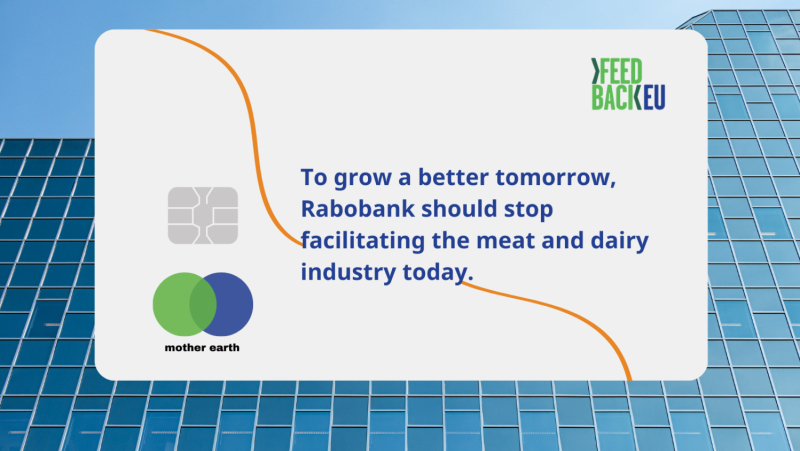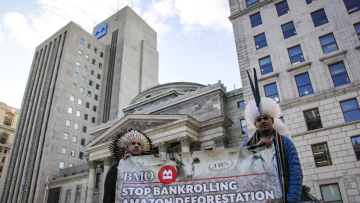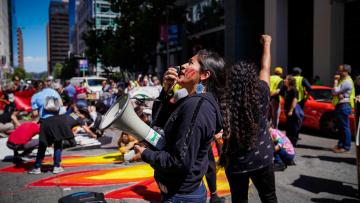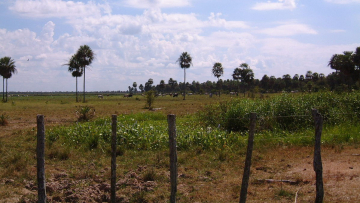Rabobank called on to stop billions of dollars in finance to polluting industrial meat and dairy companies
Frank Mechielsen, Executive Director Feedback EU frank@feedbackglobal.org
+316-55481678

Frank Mechielsen, Executive Director Feedback EU frank@feedbackglobal.org
+316-55481678
New research published today has found that between 2015-21, Dutch multinational banking and financial services company Rabobank provided billions of dollars in finance to 18 of the world’s most environmentally destructive industrial livestock companies despite having a commitment to the goals of the Paris Agreement, the Dutch Climate Agreement and Commitment to Sustainable Agriculture and Forests.
A group of organisations, including Feedback EU, Feedback Global, World Animal Protection and BankTrack have called on Rabobank to urgently stop financing big livestock companies. In a joint-letter to the bank’s CEO, the group highlights that continued exposure to large scale industrial livestock companies will damage Rabobank’s reputation and business, including risks of lost revenue and stranded assets.
The research finds that between 2015-21 Rabobank provided extensive financial services to five of the world’s biggest emitting industrial livestock companies – JBS, Marfrig, Tyson Foods, Dairy Farmers of America and Fonterra, including $1.941 billion in corporate loans, underwriting $1.221 billion million in bond issuances and providing revolving credit facilities. These ‘Big 5’ generated an estimated 550.8 million tonnes of greenhouse gases (GWP100) in 2021, together emitting nearly as much as the total emissions of the Netherlands and the UK combined.
Rabobank also provided financial services to Royal Friesland Campina and Vion Food Group. In 2016, these two companies together emitted an estimated 58 million tonnes GHG.
Meat production quadrupled between 1961 and 2015. With the global meat and dairy industry projected to use up almost half of the world’s 1.5°C emissions budget by 2030, shifting food systems away from industrial livestock production will be key to averting the climate crisis. This will require banks and investors to take decisive action to cut off financial support to the sector over the coming years.
In 2021, the Netherlands announced a €25 billion plan to reduce livestock numbers by 30% by 2030 in order to comply with EU nitrate regulations. In October 2022, the Dutch Parliament passed a motion which will require financial institutions to manage credit risks as a result of stranded assets, meaning that they have an obligation to bear losses arising from these types of credit risks themselves. If the Dutch government goes on to adopt the motion and develop specific policies, Rabobank will need to write off a substantial part of its loan portfolio, unless it takes action to reduce its exposure to industrial livestock companies. This highlights the significant regulatory risks Rabobank is exposed to by continuing to provide finance to industrial livestock companies.
Frank Mechielsen, Executive Director at Feedback EU said: “Industrial livestock corporations like JBS are the food system’s biggest cause of emissions, deforestation, human rights abuses, pandemic risks and animal cruelty. They are solely profit-driven and therefore hardwired to mass-produce ever greater quantities of cheap factory farm meat and dairy to preserve the profits of their core business. It is unacceptable for financial institutions like Rabobank to continue fuelling the endless expansion of this polluting industry at the expense of the climate. We need policymakers to use every tool at their disposal to ensure a just transition to lower-meat and dairy production and consumption, including public procurement, redirecting subsidies and regulating industrial livestock companies and their financial backers to cut off the financial fodder for this polluting industry.”
Hannah Greep, Banks & Nature Campaign Lead at BankTrack said: “Our nature and climate demand a reduction in industrial meat production, but banks seemed to have missed the memo and continue to ignore the impacts of their financed activities in this area. Continued investment in climate-intensive sectors such as industrial livestock exacerbates the risks of planetary collapse, drives biodiversity loss and violates human rights; while also posing serious financial consequences for banks like Rabobank. They cannot shy away from this issue any longer.”
Dirk-Jan Verdonk, Director at World Animal Protection Nederland, said: “Rabobank has known for a long time that the global livestock industry causes massive animal suffering, destroys precious nature and is a major contributor to global warming. Moreover, the bank has a great historical responsibility. So far, the steps the bank is taking leave much to be desired, while the urgency is growing by the day. If Rabobank is serious about striving for a sustainable food system, it is not appropriate to continue investing in companies like JBS that are holding back the necessary transition.”
Prof Hans Pörtner, scientist and co-chair of the UN Intergovernmental Panel on Climate Change, speaking last year to the European Parliament, said: “Without reducing and cutting down on meat consumption and the associated high-intensity agriculture systems, we will not be able to keep global warming to 1.5 degrees. That is very clear.”
Notes to editors
Industrial livestock financing:
- Between 2015 and 2020, global meat and dairy companies received over $478 billion in backing by over 2,500 investment firms, banks, and pension funds headquartered around the globe.
- Between 2015-21, Rabobank provided $3.6 billion in corporate loans, underwrite nearly $2 billion in bond issuances, and provided revolving credit facilities to 19 of the world’s most environmentally destructive industrial livestock companies. These companies were: JBS, Marfrig Global Foods, Cargill, Tyson Foods, Dairy Farmers of America, Minerva Foods, Fonterra Cooperative Group Ltd, Groupe Lactalis, WH Group / Smithfield Foods, Inner Mongolia Yili, Saputo, Royal Friesland Campina, China Mengniu Dairy, DMK Deutsches Milchkontor, Vion Food Group, Charoen Pokphand Group, Koch Foods, Perdue Farms, and Koch Foods.
In the EU, livestock:
- Causes 81-86% of the EU's total agricultural GHG emissions.
- Uses 71% of EU agricultural land (pasture + cropland), including 63% of EU cropland (excl. pasture) to grow animal feed, meaning more cropland is used to grow animal feed than to feed people directly. In addition, substantial land is used overseas to provide meat, dairy and animal feed imports to the EU.
- Receives €30 billion in EU subsidies (18-20% of the EU's whole budget).
- Was promoted with approximately €250 million of EU money 2016-20 (32% of EU promotional funds - while only 19% was spent promoting fruit and vegetables).
- Europeans eat roughly double global average per capita meat consumption, far more than health guidelines recommend.
Specific on JBS:
- Brazilian meat giant JBS, the world’s highest emitting livestock company, is estimated to be responsible for 287.9 million tonnes of greenhouse gas emissions (GWP100 basis) in 2021, equivalent to over one and a half times the Netherlands’ total emissions (167.8 million tonnes in 2021).
- The research finds that between 2015-21 Rabobank provided extensive financial services to JBS, including a total of $1.08 billion in corporate loans, underwriting $491 million in bond issuances and providing revolving credit facilities.
Types of financing:
- Corporate loans: Companies borrow money from a financial institution, with a maturity date by which they have to pay this back with interest. Long-term corporate loans are particularly useful to finance expansion plans.
- Bond issuances: Issuing bonds involves cutting a large loan into small pieces and selling each piece separately, which are traded on the stock exchange. To issue bonds, a company needs the assistance of one or more (investment) banks which underwrite a certain amount of the bonds. Underwriting is in effect buying with the intention of selling to investors. Still, in case the investment bank fails to sell all bonds it has underwritten, it will end up owning the bonds.
- Revolving credit facilities: Provides a company with an option to take up a loan from a bank (or more often: a banking syndicate) when it has an urgent financing need. It is similar to a credit card. Companies can use the revolving facility up to a certain limit, but they don’t have to. Revolving credits are often concluded for a five-year period and then renewed, but many companies renegotiate their revolving credit facility every year with the same banking syndicate. Amounts, interest rates, fees and participating banks can change slightly every year.
GWP use:
Global warming potential (GWP) is a measure of how much heat a given greenhouse gas traps in the atmosphere over a period of time compared to CO2. CO2 is defined as having a GWP of 1. Other greenhouse gases have different warming effects over different timescales – for instance, methane is far more powerful than CO2 in the short-term, but spends a shorter time in the atmosphere so it’s impact accumulates less over time. International climate policy usually uses GWP100 – the global warming potential of different greenhouse gasses over a 100 year period. However, given the importance of lowering global temperatures in the next 20 years, particularly as exceeding certain temperatures could trigger tipping points (large and possibly irreversible changes in response to environmental or anthropogenic disturbances once a certain critical threshold is reached), GWP20 is also an important measure – the global warming potential of different greenhouse gasses over a 20 year period.
Data source:
The data provided above on Rabobank’s financial services to the above companies is based on two datasets commissioned by Feedback from not-for-profit research firm Profundo (www.profundo.nl), utilising Refinitiv, Bloomberg, IJGlobal, Trade Finance Analytics, company publications, company registers and media archives to identify financial relationships:
- A dataset covering 2015-19 financial relationships between international financial institutions and the world’s largest meat and dairy companies (list based on IATP & Grain 2016 report Emissions Impossible). These findings were originally published in Feedback’s Butchering the Planet report (see Annex 2 for more info on methodology).
- An as yet unpublished 2016-21 dataset covering financial relationships between international financial institutions and a broader list of some of the world’s largest meat and dairy companies
Rabobank industrial livestock finance data from the above two datasets available on request.



